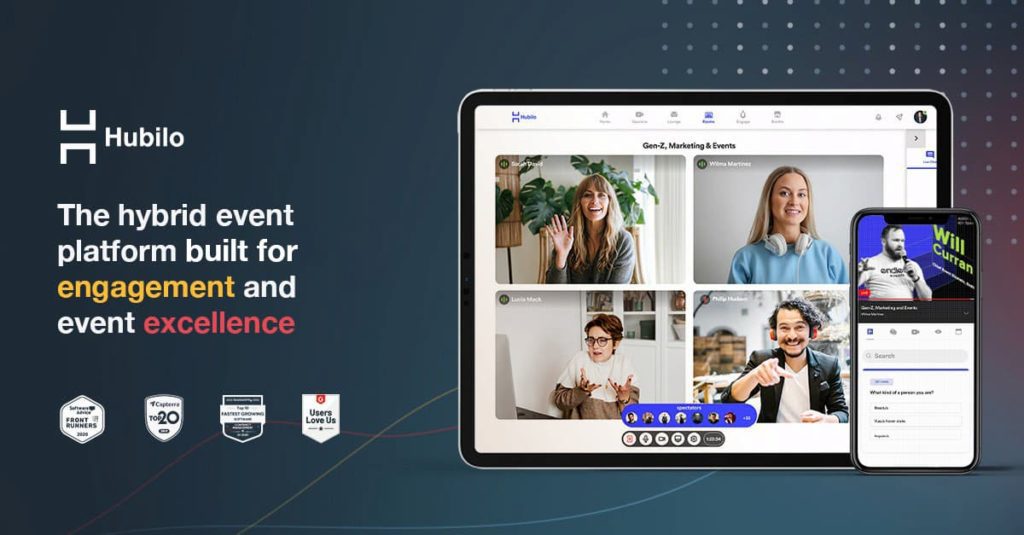The #EventIcons podcast is back with a very special guest: Hubilo‘s CEO Vaibhav Jain. Hubilo is the leading global virtual and hybrid event technology company. Under Vaibhav’s leadership, Hubilo has raised over 150 million in less than a year from a leading hedge fund and venture capital firms globally. And it still continues to grow exponentially internationally.
Vaibhav’s vision is to create a solution that works for every possible industry where content and community come together beyond the business world. He and Karmen will talk about how Hubilo got started, what challenges they faced along the way, and what are the dos and don’ts of the events industry, as learned in 2021. Let’s jump right in!

How Vaibhav Jain & Hubilo Got Started
Before they tackle the topic of the dos and don’ts of 2021, Karmen asks her guest to give the audience some insight into how he got into the events industry and how Hubilo started.
“Hubilo started during the pandemic,” Vaibhav Jain says. “Before, we were an offline event management software solution for enterprises. We were catering to offline events and were mostly known for retreat-based events for employees. When the pandemic hit, all the events started getting canceled or postponed. Most of the contracts applied force majeure clause and ended the contract.”
Then, they started thinking of different ways to generate some revenue. “We quickly repackaged our existing solutions and launched a virtual platform within 26 days. As soon as we did that, a lot of clients started flocking to us. That was the start of our journey.”
The Value Of Virtual Events
Karmen is curious about their journey since then. “Can you recap 2021 and move forward to 2022?”
“2020 was when people had to forcefully move towards virtual events,” he says. “They’d already taken money from their sponsors and their attendees. They had to give them something and virtual events or webinar-based platforms were the perfect places to hold their content. People realized that virtual events were working for them – they were getting a lot of branding and leads with less effort, money, and team members required. Virtual events became a new channel for marketing folks. They were able to use these platforms to create revenue for them.”
“That completely got digitalized during 2022. Now during 2021 and 2022 as well, what people have started doing is earlier virtual events. There was always a physical event, which was a predecessor to a virtual event. Now, what we are seeing is the number of events increasing. Let’s say a company used to do about ten events in a year. They would now do about 15 events in a year with a mixed strategy of physical, hybrid, and virtual events,” he adds.
Event Dos & Dont’s Of 2021
Karmen wants to recap 2021. What are some of the don’ts of 2021 in Vaibhav’s opinion?
His first piece of advice relates to his company. “In 2021, I had to learn was talking more to the team about how we were on a growth path and that things are going to be different. If you would have spent more time doing that, people would have been more aware of where the company was moving.”
“Second, you cannot do a physical event and a virtual event at the same time and with the same kind of content. You have a different type of audience. It’s common for an in-person event to start late, but if a virtual event is starting late, then the audience might not stay on the event platform for a long time.”
The third don’t is choosing an event platform without a clear roadmap. “The platform might not be able to offer you all the platform features at this point in time, but they can promise to offer them because they’re on the roadmap. However, if something is not on that roadmap, then it’s not really there.”
And The Dos Of 2022?
“The first is the amount of research that every event prof has done to understand that there are so many different platforms. I’ve seen people creating matrixes where they compare one platform to the other.”
“Secondly, people have been spending more time understanding what content needs to be delivered. It cannot just be a presentation. How can you engage audiences beyond just the content?”
The third positive thing Vaibhav mentions is going over and beyond for attendees. “Event profs have used various experiential services on top of virtual events, such as sending food to all your employees at the same time globally. That sounds like magic.”
“People have been quite innovative, resilient, and have shown a lot of grit when it comes to the entire change that the events industry went through. I believe that event managers are the only folks in this space who adopt technology fast,” he adds.
 What About Vaibhav’s Challenges?
What About Vaibhav’s Challenges?
Karmen asks Vaibhav Jain to share some challenges Hubilo has faced as a company with the audience.
Vaibhav lists several challenges. “The first challenge was being from India and selling globally. You needed to have a workforce that worked 24/7, at odd hours in India. You had to convince a lot of people in India to do that by paying them extra or giving them more incentives.”
Then, he mentions working with a globally distributed team. “We did not have experience in hiring people that were outside India and then convincing them to join a startup that is based out of some city in India. It’s not just that you need to have the money to pay them, they also need to believe in your mission.”
“Third, we were bootstrapped in the initial days. We were not able to invest heavily in the technology that prevailed that our competitors had. So we had to do a lot of manual work to ensure that our entire system works 24/7. What we did was we had put in a lot of checks and balances to allow us to do that.”
Be As Close To Your Customers As Possible
Karmen tells the audience that Vaibhav is only 30 years old. That being said, she wants to know how he has come so far at such a young age. “Where do you come up with these ideas? Reveal it to us,” she jokes.
“I’m quite a competitive person, so if I get pushed, I like to push back,” he explains. “I have spent a lot of time up-leveling myself and learning as much as I could. I have learned to talk in logic. If you’re bringing logic to a conversation, it helps a lot. And I like to believe my gut as well.”
“Next, I have a CEO’s office that is like my intelligence arms. It keeps me updated about how the industry is evolving. And finally, I’ve added almost 8,000 event managers on my LinkedIn profile. What they post keeps me much more aware than any of the industry blogs. I’m able to sense what they are using and what kind of problems they have. So just keep on investing more time and be as close as you can to your customers. That way, when you are having those conversations with your employees, then you’re able to bring much more to the table. Rather than just talking to them about sales or marketing, you’re able to bring a 360-degree view, which is internal as well as external.”
 What Makes A Good Leader?
What Makes A Good Leader?
“There are different leadership styles, but what is helping you the most to make impactful decisions in a timely manner?”
“The leader should be as self-aware as possible,” Vaibhav explains. “You need to know what your strengths are and hire people with different personalities from yours. Whenever I talk to someone, I try to be extremely calm. Also, when it comes to conversations, content matters more than the way that content is delivered. And once you are able to keep your ego aside and reply to that content with logic, they follow you.”
He also mentions creating shared goals between different teams. “We have a common goal across the entire company. Then, we have shared goals between different departments who work with each other that actually push you not only to achieve the set of OKRs that you have for yourselves but also to work for those shared goals. Then, you need to recognize and reward people the right way in front of the entire company.”
Vaibhav Jain’s Final Advice
As with all #EventIcons guests, Karmen asks her guest for one final piece of advice for event planners.
Vaibhar says research. “Research your audiences better. Where they are, what they like to do, and crafting your event strategy according to that. Don’t put all your eggs in one basket, and by that, I mean either going virtual or physical. It needs to be a mixed bag of strategies. 2022 is will be the year that is going to define how the events industry will move forward. When you think about a particular event, strategize through research. Event planners spend less time on research and more on execution.
“You’re an event technology company and we’re an event management company. But we both firmly believe in dedicating time to plan events out. Expand event timelines to make sure that execution is flawless,” Karmen concludes.
We hope you enjoyed today’s episode with Vaibhav Jain, a true thought leader in the realm of event technology. Stay tuned for more episodes with more awesome, iconic guests!











